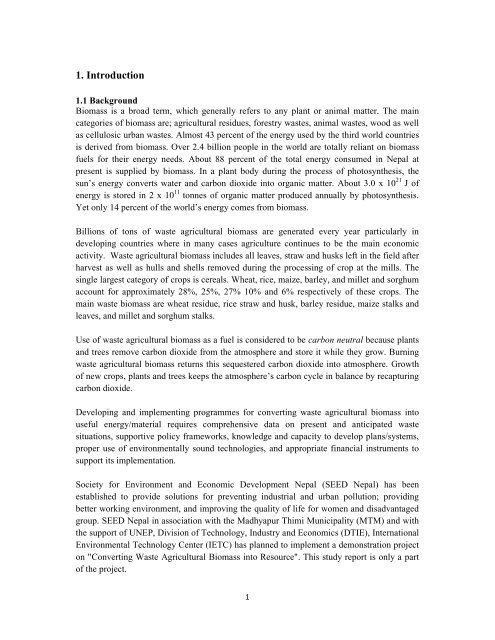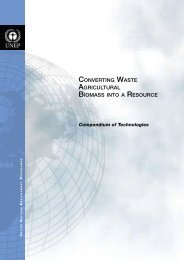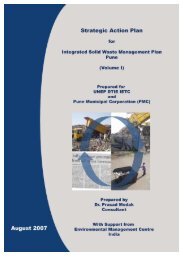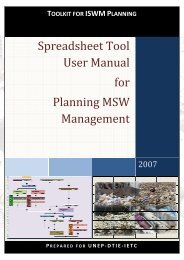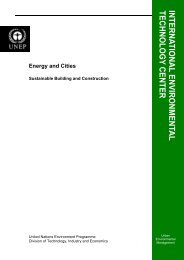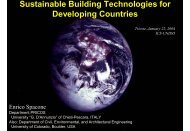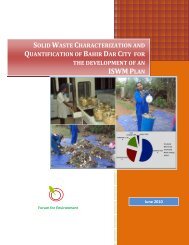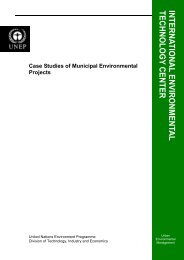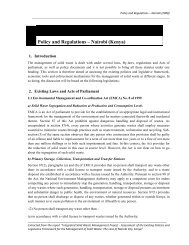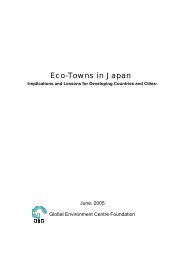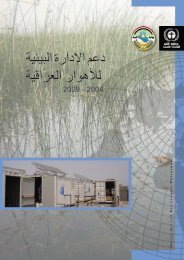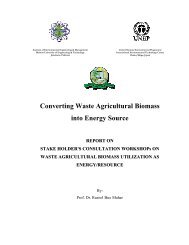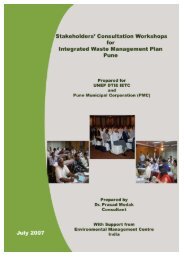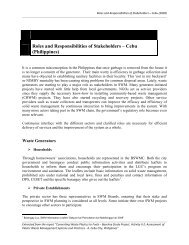Baseline Study Report on CQ of WAB final - International ...
Baseline Study Report on CQ of WAB final - International ...
Baseline Study Report on CQ of WAB final - International ...
Create successful ePaper yourself
Turn your PDF publications into a flip-book with our unique Google optimized e-Paper software.
1. Introducti<strong>on</strong><br />
1.1 Background<br />
Biomass is a broad term, which generally refers to any plant or animal matter. The main<br />
categories <strong>of</strong> biomass are; agricultural residues, forestry wastes, animal wastes, wood as well<br />
as cellulosic urban wastes. Almost 43 percent <strong>of</strong> the energy used by the third world countries<br />
is derived from biomass. Over 2.4 billi<strong>on</strong> people in the world are totally reliant <strong>on</strong> biomass<br />
fuels for their energy needs. About 88 percent <strong>of</strong> the total energy c<strong>on</strong>sumed in Nepal at<br />
present is supplied by biomass. In a plant body during the process <strong>of</strong> photosynthesis, the<br />
sun’s energy c<strong>on</strong>verts water and carb<strong>on</strong> dioxide into organic matter. About 3.0 x 10 21 J <strong>of</strong><br />
energy is stored in 2 x 10 11 t<strong>on</strong>nes <strong>of</strong> organic matter produced annually by photosynthesis.<br />
Yet <strong>on</strong>ly 14 percent <strong>of</strong> the world’s energy comes from biomass.<br />
Billi<strong>on</strong>s <strong>of</strong> t<strong>on</strong>s <strong>of</strong> waste agricultural biomass are generated every year particularly in<br />
developing countries where in many cases agriculture c<strong>on</strong>tinues to be the main ec<strong>on</strong>omic<br />
activity. Waste agricultural biomass includes all leaves, straw and husks left in the field after<br />
harvest as well as hulls and shells removed during the processing <strong>of</strong> crop at the mills. The<br />
single largest category <strong>of</strong> crops is cereals. Wheat, rice, maize, barley, and millet and sorghum<br />
account for approximately 28%, 25%, 27% 10% and 6% respectively <strong>of</strong> these crops. The<br />
main waste biomass are wheat residue, rice straw and husk, barley residue, maize stalks and<br />
leaves, and millet and sorghum stalks.<br />
Use <strong>of</strong> waste agricultural biomass as a fuel is c<strong>on</strong>sidered to be carb<strong>on</strong> neutral because plants<br />
and trees remove carb<strong>on</strong> dioxide from the atmosphere and store it while they grow. Burning<br />
waste agricultural biomass returns this sequestered carb<strong>on</strong> dioxide into atmosphere. Growth<br />
<strong>of</strong> new crops, plants and trees keeps the atmosphere’s carb<strong>on</strong> cycle in balance by recapturing<br />
carb<strong>on</strong> dioxide.<br />
Developing and implementing programmes for c<strong>on</strong>verting waste agricultural biomass into<br />
useful energy/material requires comprehensive data <strong>on</strong> present and anticipated waste<br />
situati<strong>on</strong>s, supportive policy frameworks, knowledge and capacity to develop plans/systems,<br />
proper use <strong>of</strong> envir<strong>on</strong>mentally sound technologies, and appropriate financial instruments to<br />
support its implementati<strong>on</strong>.<br />
Society for Envir<strong>on</strong>ment and Ec<strong>on</strong>omic Development Nepal (SEED Nepal) has been<br />
established to provide soluti<strong>on</strong>s for preventing industrial and urban polluti<strong>on</strong>; providing<br />
better working envir<strong>on</strong>ment, and improving the quality <strong>of</strong> life for women and disadvantaged<br />
group. SEED Nepal in associati<strong>on</strong> with the Madhyapur Thimi Municipality (MTM) and with<br />
the support <strong>of</strong> UNEP, Divisi<strong>on</strong> <strong>of</strong> Technology, Industry and Ec<strong>on</strong>omics (DTIE), Internati<strong>on</strong>al<br />
Envir<strong>on</strong>mental Technology Center (IETC) has planned to implement a dem<strong>on</strong>strati<strong>on</strong> project<br />
<strong>on</strong> "C<strong>on</strong>verting Waste Agricultural Biomass into Resource". This study report is <strong>on</strong>ly a part<br />
<strong>of</strong> the project.<br />
1


